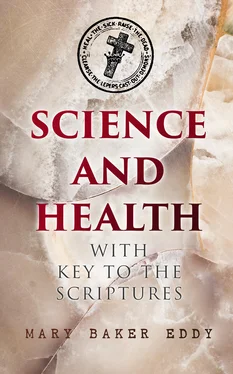The effect of mind on health and happiness is seen in this: if one turns away from the body with such absorbed interest as to forget it, the body experiences no pain.
Under the strong impulse of a desire to fill his part, a noted actor used night after night to go upon the stage and sustain his appointed work, walking about as spry as the youngest member of the company. This old man was so lame that every day he hobbled to the theatre, and sat aching in his chair till his cue was spoken, — the signal that made him as oblivious of physical infirmity as if he had inhaled chloroform, though he was in the full possession of his senses.
Note the unspeakable peace that is felt from an all-absorbing spiritual love.
Selfishness and sensualism are educated in us by thoughts ever-recurring to one's self, by conversation about the body, and by the expectation of perpetual pleasure or pain from it; and this education is at the expense of spiritual growth. If we array thought in mortal vestures it must cease its immortal flight.
We cannot fathom the nature and quality of God's creation through the shallows of mortal fancy. We must reverse our feeble flutterings, our efforts to find Life and Truth in person or in matter, and appeal above man, to God. We must rise to clearer views, that inspire the God-man, and thus reach the centre of being.
Job said, “I have heard of Thee by the hearing of the ear; but now mine eye seeth Thee.” Mortals will echo Job, when the supposed pains of matter cease to predominate. They will then drive away false estimates of life and happiness, and attain the bliss of loving unselfishly, working patiently, and conquering all that is unlike Him.
There can be but one Creator, who has created all. Whatever seems to be a new creation, or being, is but a new discovery of something old, — new multiplication, or a self-division of mortal thought, — as when some finite sense peers out from its cloisters with amazement, and attempts to pattern the Infinite.
Multiplication of a human and mortal sense of persons or things is not creation. Personal and material man, like an atom of dust thrown into the face of spiritual immensity, is a flickering sense, instead of an abiding consciousness of being.
Mortals must look beyond fading, finite forms, if they would gain the true sense of things. Where shall the gaze rest, in the unsearchable realm of Mind? We must look where we would walk, and we must act as possessing all power from Him in whom we have our being.
Starting from a higher standpoint, one progresses spontaneously, even as light emits light without effort; for “where your treasure is, there will your heart be also.” Distrust of one's ability to gain the good desired, and bring out better and higher results, often hampers the trial of one's wings, and ensures defeat at the outset.
A scientific view of progress admits the possibility of every good achievement, and first sets about discovering what God has already done for us.
Our mortal beliefs defraud us. They make man an involuntary creator, — producing evil when he would create good, forming deformity when he would outline grace and beauty, injuring those he would bless. He becomes a general mis-creator, whose “touch turns hope to dust.” He might say in Bible language, “The good that I would, I do not; but the evil which I would not, that I do.”
The senses say that man's birth is sometimes untimely, and his death lamentable; that weeds grow apace, and choke the flowers not already scorched by the sun, or nipped by untimely frosts. Such are not the facts of God's creation. The Truth of things is perennial, and the error is seen only as we look from wrong points of observation.
Mortals are egotists. They fancy themselves independent workers, personal authors, and even privileged originators of something that Deity would not or could not create.
The foundation of mortal discord is a false sense of man's origin. To begin rightly is to end rightly. Every calculation that starts from the body, starts wrongly. Immortal Mind is the only Cause and impersonal Principle. Cause does not exist in matter, in mortal mind, or in personality.
Because we look to the body for pleasure, we find pain. For Life, we find death; for Truth, we find error; and for Spirit, its opposite, called matter. Now reverse this action. Look away from the body, into Truth and Love, the Principle of all happiness, harmony, and immortality. Hold thought steadfastly to the enduring, good and true, and you will bring these into your experience, proportionately to their occupancy of your thoughts.
Detach the sense from the body, or matter, only attached to it through human belief, and you may learn the meaning of God, or good, and the nature of the immutable and immortal. Breaking away from the mutations of time and sense, you will neither lose the solid objects and ends of Life, nor your own identity. Fixing the gaze on the arch of heaven, you may fly as the bird flies, that has burst from the egg and preened its wings for a skyward flight. In this line of thought is Sir John Bowring's translation from the Russian: —
Though but an atom midst immensity,
Still I am something, fashioned by Thy hand.
I hold a middle rank 'twixt heaven and earth,
On the last verge of mortal being stand. —
Close to the realm where angels have their birth,
Just on the boundaries of the Spirit-land!
Life and blessedness are the only proofs of existence, whereby you can recognize it. The scientific sense of being, forsaking matter for Spirit, by no means suggests man's absorption into Deity, and the loss of his own identity, but confers upon him an enlarged individuality, a wider sphere of thought and action, a more expansive benevolence, a higher and more permanent being.
We should forget our bodies, in remembering God and the human race. Good demands of man every hour, wherein to work out the problem of being. Consecration to God lessens not man's dependence on Him, but heightens it. Neither does it diminish his obligations to God, but shows the paramount necessity of meeting them. Science takes naught from the perfection of God, but ascribes to Him the greater glory.
When man resigns his claims as a creator, blends his thoughts of existence with those of his Maker, and works only as He works, man will no longer grope darkly, and cling to earth because he has not tasted heaven Longfellow was thus thinking when he wrote: —
And the feeble hands and helpless,
Groping blindly in the darkness,
Touch God's right hand in that darkness,
And are lifted up and strengthened.
“Putting off the old man” and his deeds, mortals thereby “put on immortality.”
Who that has felt the loss of physical pleasure, has not gained stronger desires for impersonal joy? The aspiration after these comes even before we find what belongs to Wisdom and Love. The loss of earthly hopes and joys has brightened the ascending plane of many a heart. The pains of sense quickly inform us that its pleasures are mortal, and that joy is spiritual.
The sinner believes himself happier for wrong-doing, and the saint that he suffers for doing right. Both inferences are false. They are the cobweb conceptions of material sense, — transient forms of error flitting before mortals, only to sink into rapid oblivion.
Would existence be to you a blank without personal friends? Then the time cometh when you will be solitary, left without sympathy and alone; for this vacuum is to be filled with God, spiritual Truth, and Love, impersonal instead of personal Good. When this hour of development comes, even if you cling to a sense of material joys, Divine Love will force you to accept what best promotes your growth. Friends will betray, and personal enemies will encompass you; but the lesson will be sufficient, for “man's extremity is God's opportunity.” Thus He teaches mortals to lay down their personal treasures, in order to gain the Principle of right, and thus learn the divine way in Science.
Читать дальше












